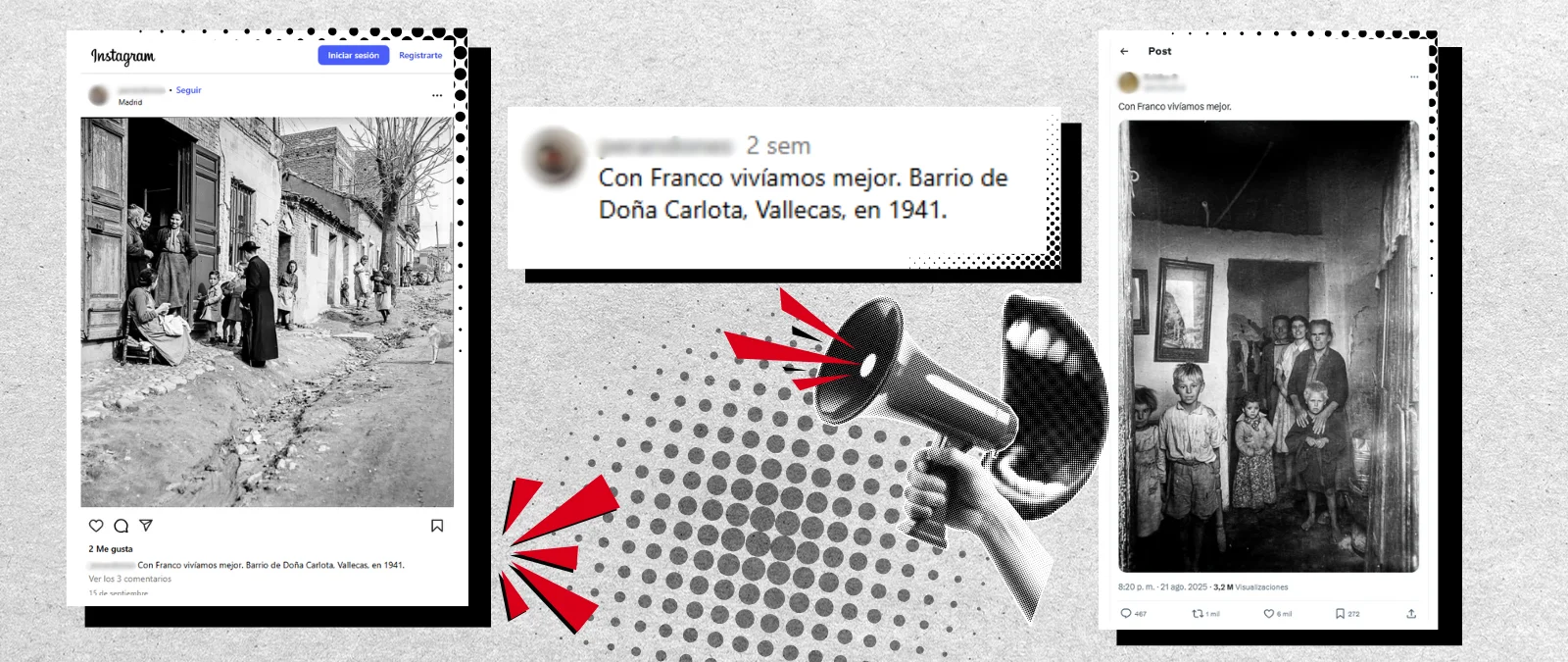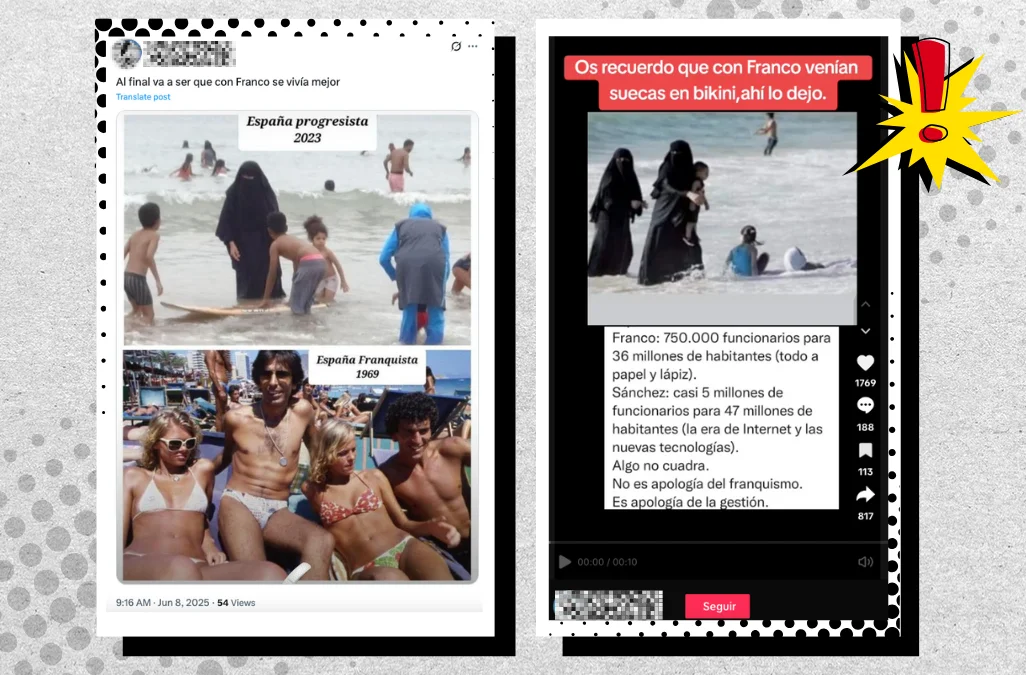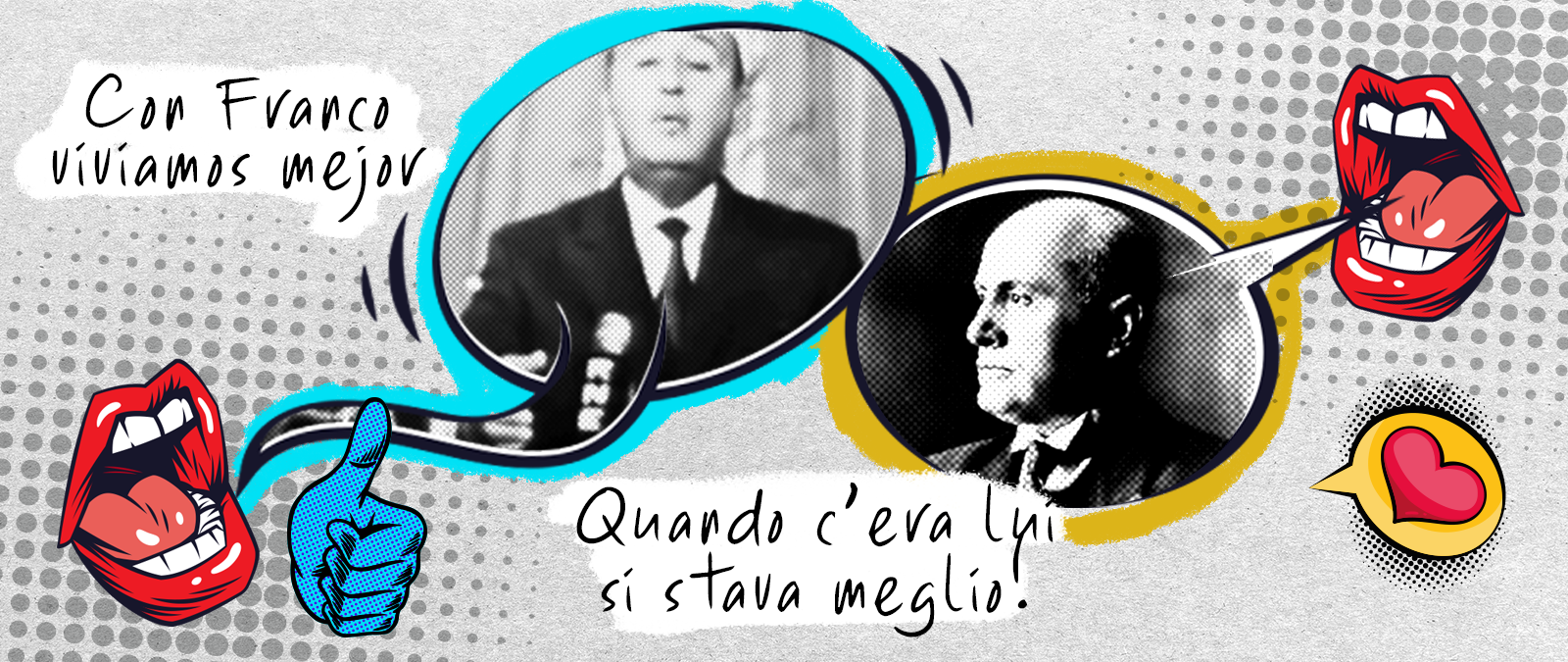“We lived better under Franco” or “When he (Mussolini) was around, things were better” are among the most frequently repeated narratives about these dictators and their regimes on social media, according to the content analysed by Maldita.es and Facta. These discourses are fuelled by disinformation that tends to resurface during emergencies or at moments of social tension that spark public debate.
They also rely on other tactics that seek to legitimise the narrative by drawing direct comparisons with the present, for instance, housing issues, or by using decontextualised statistics as supposed evidence of credibility.
Used to portray both totalitarian regimes as periods of greater security, material well-being and stability compared to today’s democracy, the narratives analysed (many of which have circulated since those dictatorships were still in power, as experts note) draw on techniques such as nostalgia for an idealised past, now amplified through contemporary tools like social media.
Pop Fascism: rewriting history in the digital age
This article is the second of an international investigation carried out by Maldita.es (España) and Facta (Italy). The project explores how, through the use of contemporary social media features, fascist discourse infiltrates our daily lives in three stages: normalisation, acceptance and idolisation.
This research was made possible with the support of Journalismfund Europe

“We lived better under Franco”: a narrative built on disinformation, decontextualised figures and other manipulation strategies
In Spain, the expression “we lived better under Franco” has become shorthand for a series of recurring sub-narratives, many of them disinformative, that appear across dozens of Telegram channels, viral TikTok videos, YouTube clips or on X (formerly Twitter), among others. “Life was safer,” “housing was affordable,” “public works were efficient,” or “taxes were fairer” are some of the most common.
The narrative reappears when major news events occur, such as the April 28, 2025 blackout or the DANA floods that struck Valencia in October 2024. Social media users reacted by claiming that “this wouldn’t have happened under Franco” or that “thanks to what Franco built, the consequences weren’t as serious,” often accompanying their posts with false or misleading content.
For example, during the floods in eastern Spain, messages circulated alleging that democratic governments had demolished reservoirs built under Franco’s rule. “After the 1957 flood, Franco ordered the construction of a new riverbed and a series of dams and reservoirs to contain the water from such events. This government has demolished four of those reservoirs, and here’s the result,” read one of the most viral messages. In reality, while Franco did order the redirection of the Turia River and the construction of the Loriguilla reservoir, which remains operational, no reservoirs have been demolished. The only infrastructures dismantled were seven small obsolete dams that were never designed for water storage.

The phrase also appears alongside photographs from the dictatorship years, often depicting large families. On Instagram, for example, one image allegedly taken in Madrid’s Vallecas neighbourhood in 1941 was shared with the caption “We lived better under Franco.” In other cases, the expression is used ironically to convey the opposite. One notable example was a 1952 photograph of a family from Málaga, taken during the Franco regime, which went viral after Grok, X’s AI system, mistakenly identified it as a picture of a family in Alabama during the Great Depression, denying that it had been taken in Francoist Spain.

The narrative is also used to discuss housing, comparing today’s situation with that of the dictatorship. In recent years, Franco has been credited with alleged achievements such as having built 4.5 million social housing units, a hoax already debunked by Maldita.es. Historian Carlos Barciela, in his book We lived better under Franco: pomp and circumstance of forty years of dictatorship, explains that housing was one of the key pillars of the regime’s propaganda, presented as a social right but which, in reality, remained little more than a slogan.
The messages that fuel these narratives usually circulate as statements taken out of context or as outright disinformation. According to Matilde Eiroa, Professor of History at Universidad Carlos III de Madrid, they are “a propaganda tool that is easy to exploit,” relying on “the idealisation of the past, our childhood and youth”, elements people can easily connect with. Sociologist and philosopher Zygmunt Bauman described this phenomenon as “retrotopia”, a longing for a past in which everything seemed better, whether real or not.
In this way, disinformation and nostalgic decontextualised content become vehicles for spreading such narratives through simplified phrases, posters or photographs. A widely used visual strategy involves side-by-side image comparisons, one from the present and one from the Franco regime, to push particular messages, for instance, anti-immigration ones.

This narrative also spreads through strategies like those used by the YouTube channel RescueYou, which had 245,000 subscribers as of October 2025. “Was life better under Franco? Retirees speak unfiltered about their experiences.” With this and similar titles, this channel publishes short videos featuring interviews with old people who lived through the dictatorship, directly asking them whether life was indeed better under Franco. “I lived under Franco. We lived in a small house, my parents never locked the door. My mother just pulled the curtain at night, and we slept peacefully. Not now. I think that says it all. With Franco I had a job, I went to football, came home and never had a problem. I never had a problem with Franco…” says one of the interviewees.

According to Eiroa, who explores this phenomenon in her book Franco, from hero to comic figure of contemporary culture, the phrase “we lived better under Franco” has been circulating since “the late 1970s and early 1980s,” alluding to “disenchantment with democracy and the idea that under Franco there was peace, no crime, and stable jobs.”
She explains that, through simple and easily digestible language, these contents aim to promote “historical revisionism, presenting the dictatorship in a biased way, highlighting its supposed economic or social achievements while concealing how those were achieved, ignoring political persecution, lack of freedoms, violence, and how the regime favoured the rich, major landowners and businessmen at the expense of workers.”
For Juan Antonio Ríos, Professor of Spanish Literature at the University of Alicante, expert in 20th-century history and one of Maldita’s “superpower” contributors, these videos depict Francoism as a homogeneous historical period: “But there’s a huge difference between the famine of the autarky of the regime’s early years and the developmentalism of the 1960s,” for example. “The problem”, he adds, “is that, for obvious reasons, very few people remain who lived through the darkest stage of the dictatorship and are still able to recall it.” According to Ríos, these supposedly spontaneous street interviews “abandon the historical narrative to select a handful of testimonies without addressing their representativeness.”
At times, this same narrative is legitimised through foreign voices, using the same man-on-the-street interview format. YouTuber David Santos, for example, interviewed a young woman, emphasising her Ecuadorian nationality, during protests near Ferraz, the headquarters of Spain’s Socialist Party (PSOE), after the UCO published a report pointing to the alleged involvement of Santos Cerdán in receiving commissions in the so-called Koldo case. After several questions, the interviewer asked, “And… Viva Franco?”, to which the young woman shouted back, “¡Viva Franco!” The video was titled “Ecuadorian yesterday in Ferraz: ‘Viva Franco and Viva España.’”
According to Kye Allen, Doctor in International Relations and researcher at the University of Oxford, such content contributes to “the normalisation of what took place under these fascist dictatorships and authoritarian regimes, and to a sort of trivialisation of their crimes,” in addition to the nostalgia that accompanies them.
Social Security and other achievements falsely attributed to Franco
Claims that Franco created Spain’s Social Security system, paid holidays, or the Sunday rest are among the pieces of disinformation that Maldita.es has debunked in recent years.
As Barciela explains in his book, all these achievements falsely attributed to Franco stem from the regime’s systematic propaganda, which reinvented his figure as the embodiment of every possible virtue: “a distinguished soldier, Europe’s youngest general, the man who defeated communism,” and so on. In his words, “those supposed virtues are nothing more than the product of Francoist propaganda.” The narratives we see circulating today may therefore be based on, or direct descendants of, the disinformation and propaganda messages already spread during the dictatorship itself.
For Matilde Eiroa, one reason these narratives spread so easily is “the limited presence of professional historians in digital environments,” something she considers “extremely harmful for the dissemination of historical knowledge.” Very few, she adds, share their work online. She also highlights other obstacles to verifying such claims, such as the fact that books published during the dictatorship only presented the “official” version of events due to strict censorship.
This does not happen only in Spain. In Italy, every Christmas the false claim resurfaces that the tredicesima (the thirteenth-month salary paid to employees and pensioners in December) was a gift from Il Duce during the Ventennio, the fascist period. In reality, it was a 1937 sectoral measure that applied only to industrial employees classified as impiegati (white-collar workers), while the universal right to a thirteenth-month salary came only after the fall of fascism, in 1946 and 1960.
Hitler: from rehabilitating his image to denying the Holocaust and any historical responsibility
In the case of Adolf Hitler, the strategy observed in social media content follows the same pattern as in the narratives about Franco and Mussolini.
On the one hand, messages circulate that seek to detach him from his historical responsibility for the Holocaust and the Second World War, downplaying his role in the extermination of millions of people and instead portraying him as a “misunderstood” leader or one who was “demonised by the victors.” This narrative often draws on recurrent phrases such as “history is written by the victors,” and on insinuations that the crimes attributed to Nazism were “exaggerated” or “manipulated.”
There are also denialist and disinformative contents that directly question the existence of gas chambers or minimise the number of Jewish victims of the Holocaust, despite the six million deaths documented by the United States Holocaust Memorial Museum and many other institutions. These messages present themselves as “alternative versions” of history that has supposedly been “censored,” even though the Holocaust is one of the most thoroughly researched and documented events in modern history. Institutions such as UNESCO provide educational resources and explanatory materials precisely to counter these distortions.
Other narratives related to Hitler move in the opposite direction: rather than denying or relativising his crimes, they glorify them. Under the slogan “Hitler was right,” social media posts celebrate him as a “visionary leader” or “Europe’s last true defender,” claiming he was protecting his people from internal and external enemies.
In many of these posts, Hitler’s image appears alongside racist, xenophobic and antisemitic messages, often referencing the massacres committed by Israel in Gaza, to justify the Holocaust, with slogans such as “Hitler was right.”
As with content that glorifies Francoism, others romanticise the rhetoric and aesthetics of Nazi Germany, depicting the Third Reich as a period of technological, cultural or economic splendour. Such posts are frequently accompanied by dramatic music edits designed to amplify the epic tone of the images.
Young Spaniards’ and Italians’ growing preference for authoritarian regimes
According to Matilde Eiroa (Universidad Carlos III de Madrid), these narratives, their aesthetics and their spread on platforms act as vehicles “of propaganda aimed at recruiting young people,” while also serving to “diffuse their ideology.” In this way, they manage to “glorify the figures of these three leaders: recognisable icons that allow them to connect easily with that audience and help recruit new adherents.”
In Spain, data from several Center for Sociological Research (CIS) surveys, focusing on the question about “preferred political system” (see methodology at the end), show that although a clear majority of citizens (79% in 2025) still consider democracy the best form of government, the share of those who would accept an authoritarian regime has grown. Comparing the Quality of Democracy surveys from 2007 and 2025, this figure rose from 5.8% to 8.6%, and exceeds 18% when adding those who say they are indifferent on the matter.
What stands out is that this increase is concentrated among the youngest. Among 18–24-year-olds, sympathy for authoritarianism rose from 7.3% in 2007 to 17.3% in 2025; among 25–34-year-olds, from 5.4% to 17.4%. In other words, those under 35, born after Franco’s dictatorship, are today the most open to non-democratic alternatives.
This trend is echoed by a September 2024 poll by 40dB for El País and Cadena SER, which found that one in four Gen Z men (25.9% of those aged 18–26) believe that “in some circumstances,” authoritarianism may be preferable to democracy. Among women in the same age group, the figure drops to 18.3%. The gender gap widens among millennials (27–42): 22.9% of men versus 12.7% of women.
The CIS study on Ideology and Polarisation (October 2024) adds another revealing data point: 27% of the public agreed with the statement, “I wouldn’t mind living in a less democratic country if it guaranteed me a better quality of life.” Among 18–24-year-olds, that figure rises to 38%.
Young Italians express similar views, according to a YouGov study published in July 2025 for Germany’s Tui Stiftung on young Europeans’ confidence in democracy. Only 56% of respondents (young people aged 16–26 from Germany, France, Spain, Italy, Greece, Poland and the UK) support democracy unconditionally. As for satisfaction with the democratic system, 43% of young Italians said they were dissatisfied and 24% said they would support an authoritarian government “in certain circumstances”, a percentage similar to that found in France, Spain, Poland and Greece.
For Kye Allen, researcher at the University of Oxford, “a quote that perfectly captures the interplay between social media’s amplifying effect and the normalisation” of these narratives is the statement made in 2024 by Vox MP Manuel Mariscal in Spain’s Congress: “Thanks to social media, many young people are discovering that the post-Civil War period was not as dark as this Government claims, but rather a time of reconstruction, progress and reconciliation to achieve national unity.”
Allen believes that part of the solution lies in the need for greater content moderation on platforms, as well as additional features that allow users to access a comprehensive explanation of certain historical events such as the Holocaust, alongside educational reforms.
Metodología
This text is part of a cross-border investigation carried out by Maldita.es (Spain) and Facta (Italy) between June and October 2025. The work conducted during these months focused on the collection of content from six platforms (including Facebook, Instagram, Telegram, TikTok, X and YouTube), as well as from websites. In total, more than 500 pieces of content were recorded, from which we gathered different types of information such as: user, publication date, format, language and impact, among others. Only posts glorifying Francisco Franco, Benito Mussolini or Adolf Hitler, the measures and policies implemented during their respective dictatorships, or associated symbolism were selected.
Each piece of content was analysed individually. From this analysis, we extracted different narratives which we grouped into sub-narratives according to the aim and theme of the message. We also identified the main actors and examined both their posts and their interactions with other users.
We identified posts as satirical if they contained the visible label “humour” or were published by accounts that self-identify as parody.
To measure the evolution of public opinion in surveys on the preference for political regimes in Spain, we consulted the surveys of the Spanish Center for Sociological Research (CIS), specifically those that included the question "Preferred political regime," which has been regularly asked since 1982, as can be verified in its database: https://www.cis.es/catalogo-estudios/resultados-definidos/buscador-estudios For this article, we selected the period 2007–2025 to reflect the most recent changes in public opinion. The answers given to respondents may differ slightly in their approach but not in their meaning. For example, while in some surveys one of the answers may be "In some circumstances, an authoritarian government may be preferable to a democratic one," in others it is "In some circumstances, an authoritarian regime, a dictatorship, may be preferable to a democratic one." However, they all offer five equivalent answers: Democracy is preferable to any other form of government; In some circumstances, an authoritarian government may be preferable to a democratic one; People like me don't care about a democratic regime or an undemocratic one; D.K (Don´t know); N.A (No Answer)
If you have any questions, you can contact us at [email protected].

 Memes, football and songs: how ‘Pop Fascism’ paves the way for disinformation
Memes, football and songs: how ‘Pop Fascism’ paves the way for disinformation Coded language and memes: how 'Pop Fascism' smuggles disinformation and denialism into social media
Coded language and memes: how 'Pop Fascism' smuggles disinformation and denialism into social media